Tag: Cody Smith
VIDEO: Republican House Speaker addresses the media on opening day of 2020 session
House bill to relax mandatory minimum sentencing signed into law
Judges will be able to ignore Missouri’s mandatory minimum sentencing requirements in some cases, under a House Bill that was signed into law this week by Governor Mike Parson (R).

Missouri law requires that offenders with one prior conviction serve at least 40-percent of a prison term. Those with two prior convictions must serve at least half their term, and those with three or more must serve 80-percent.
House Bill 192 contained language that would give judges flexibility in sentencing for some nonviolent offenses. It was part of a broader look at criminal justice reform that House members have been pursuing over several sessions.
The language was proposed by Representative Cody Smith (R-Carthage).
“When Governor Parson signed House Bill 192 that was the most significant mandatory minimum sentencing reform, to my knowledge, that we’ve ever had in Missouri,” said Smith. “That’s an incredibly rewarding feeling when we know that it’s become clear that harsh mandatory minimum sentencing for non-violent crimes only leads to bad outcomes, and this is a way that we can start to help change the trajectory of people’s lives.”
Smith said the number of people in Missouri’s prisons has steadily grown for decades. He said many of those being incarcerated are non-violent offenders, who have a high rate of recidivism and of committing increasingly violent offenses.
“I’ve heard it said that prison is finishing school for hardened criminals,” said Smith. “You go in for something that may be relatively innocuous in terms of violence … you come out and you’re a hardened criminal.”
Smith, who is also the chairman of the House Budget Committee, said reducing Missouri’s prison populations would also save the state money. He notes that as recently as 2017, Missouri was on track to need two new prisons to accommodate the growing number of offenders.
Ballwin representative Shamed Dogan (R) chairs the House Special Committee on Criminal Justice, which handled not only HB 192, but Smith’s original legislation, House Bill 113. He said the mandatory minimum sentencing changes will allow judges those cases to be judges.
“That is something that will give people more second chances – people who shouldn’t be in prison as long as that mandatory sentence would determine,” said Dogan. “A judge can look at that person’s overall life; they can look at the particulars of their offense, and really just letting judges do their job, which is to make tough decisions without having their hands tied behind their backs by mandatory minimum sentences.”
Other language in HB 192 will keep counties from putting an individual back in jail for failing to pay the cost of his or her earlier jail term.
The bill’s provisions take effect August 28.
Legislature proposes reforms to end ‘debtor’s prisons,’ mandatory minimum sentences
The Legislature has approved bipartisan legislation that would keep Missourians from being put back in jail for failing to pay the costs of being put in jail; and would eliminate mandatory minimum sentences for non-violent crimes.

House Bill 192 aims to end charging prisoners board bills” for their stays in jail. Persons who don’t pay those bills can be required to come to a “show-cause” hearing and risk additional jail time. Lawmakers said this amounted to putting people in a “debtor’s prison.”
The bill would allow counties to seek to collect jail bills through civil means, with no threat of jail time. The House’s 138-11 vote on Monday sends that bill to Governor Mike Parson (R).
Bill sponsor Bruce DeGroot (R-Chesterfield) worked closely with Liberty Democrat Mark Ellebracht on the legislation. DeGroot said current law is putting Missourians who’ve committed minor crimes and who can’t afford to pay fines and boarding costs back in jail, where they only incur more boarding costs.
DeGroot said in one case, a woman who stole an $8 tube of mascara incurred more than $10,000 in “board bills.”

Ellebracht said the legislation is proof that opposing parties who often vehemently disagree can come together to do good things.
The Senate added to HB 192 legislation to allow judges to waive mandatory minimum sentencing requirements for non-violent offenders who meet certain criteria. That was the goal of House Bill 113, which the House passed in February, 140-17.
It was sponsored by Carthage Republican Cody Smith.
Springfield Republican Curtis Trent said both provisions speak to priorities that Governor Parson and Chief Justice Zel Fischer both spoke about when addressing the House and the Senate earlier this year.
It’s now up to Governor Parson whether HB 192 becomes law. If it does, it would take effect August 28.
Sweeping criminal justice reform package prepared for consideration
The House Speaker has said criminal justice reform is a priority in the remaining weeks of the session, and a bill containing several proposed reforms has just been compiled. It has the backing of a man made famous by President Donald Trump earlier this year.

House Committee Bill 2, also being called the Missouri First Step Act, was assembled by the House Special Committee on Criminal Justice. It is a compilation of several individual bills, some of which have already been passed by the House.
Trump featured Matthew Charles during his State of the Union Address. Charles is the first person released from prison under the federal First Step Act, a federal reform bill signed into law by Trump in December.
In 1996 Charles was sentenced to 35 years in prison for selling crack cocaine. In prison he turned his life around and earned an early release in 2016. Though he was living a productive life, a court decision overturned his release and sent him back to prison until he was released under the First Step Act.
He’s excited about a provision in HCB 2 that would let judges ignore mandatory minimum sentences for non-violent crimes in Missouri.
The stand-alone mandatory minimum sentences legislation, House Bill 113 sponsored by Representative Cody Smith (R-Carthage), has been sent to the Senate and awaits a committee hearing.
HCB 2 will be carried by the committee’s chairman, Representative Shamed Dogan (R-Ballwin), who has been a proponent of criminal justice reform during his five years in the House.
HCB 2 would apply the state’s law restricting the use of restraints on pregnant offenders to county or city jails. That bars the use of restraints on a woman in the third trimester of pregnancy and through 48-hours after delivery while they’re being transported except in extraordinary circumstances, which must be documented and reviewed.
Representative Mary Elizabeth Coleman (R-Arnold) sponsors that legislation (House Bill 1122). She said it’s about the safety of those offenders, but also of their babies.
“It’s making sure that when women are in labor, when women are in advanced stages of pregnancy, and when they have really no risk of harm that we’re really treating people as people and that we’re being appropriate as well,” said Coleman. “It’s not about trying to be lax on people who have committed crimes. They’re paying their costs, but a pregnant woman is very vulnerable and we want to make sure that she and her child are delivered safely.”

Another piece of HCB 2 coming from a bill sponsored by Coleman (House Bill 920) would require that feminine hygiene products are available to women being held in the state’s prisons or on state charges in county and city jails.
Representative Cheri Toalson Reisch (R-Hallsville) sponsored House Bill 189, to allow people convicted of felonies to work in certain businesses that sell alcohol or lottery tickets, such as grocery or convenience stores. That is also included in HCB 2.
“Where I’m from in Boone County we have 1.5-percent unemployment. This is the second lowest in the country. We cannot find enough employees. We would like to put these felons to work,” said Toalson Reisch. “We need them to avoid recidivism and make better lives for themselves and their families.”
Two of the other pieces of HCB 2 would restrict the use of drug and alcohol testing by privately operated probation supervisors (House Bill 80 – Justin Hill, R-Lake St. Louis); and would keep courts from putting people in jail for failing to pay the costs associated with prior jail time (House Bill 192 – Bruce DeGroot, R-Chesterfield). Both of those stand-alone bills have been sent to the Senate for its consideration.
HCB 2 includes language to allow for the early parole of certain inmates over the age of 65 (House Bill 352, Tom Hannegan, R-St. Charles); to stop the confiscation of assets from a person who hasn’t been convicted of a crime (House Bill 444, Dogan); and to prohibit discriminatory policing (House Bill 484, Dogan).
HCB 2 awaits a hearing by a House committee before it can be sent to the full chamber for debate.
Earlier stories on two of the bills that are part of HCB 2:
House votes to prevent jailing of Missourians for failing to pay jail bills (HB 192)
House approves budget plan maintaining $100-million boost to transportation
The Missouri House has proposed a $29.2-billion state budget for the fiscal year that begins July 1. Among other things it maintains Appropriations Committee Chairman Cody Smith’s (R-Carthage) plan to apply $100-million of General Revenue to road and bridge projects. That would be in addition to the money in the state’s Road and Bridge Fund, which is dedicated to transportation.

If that proposal becomes law it would be the first time GR dollars have been used for transportation infrastructure. Smith said the state’s road funding has been falling behind for years, and with other proposals to support it having fallen short – including a gas tax increase that was rejected by voters in November – it’s time to consider unprecedented sources.
He also said his plan is a better option than what Governor Mike Parson (R) proposed, to use bonds to support $350-million for bridge projects, which take years to pay off.
“Going further into debt comes at a high cost. We already spend, on average, about 24-percent of the road fund on debt service as it is,” said Smith. “This plan, paying as we go, could save us as much as $100-million over the course of 15 years, and it’s really that simple.”
Democrats say this approach creates uncertainty for the Department of Transportation, which wouldn’t know year-to-year how much money the legislature might decide to give it.
Kansas City representative Greg Razer (D) said the plan also would set a precedent that transportation would compete with other state priorities that are already funded with GR dollars, including education and medical care.

Razer and other Democrats said the state should not get away from using only the Road and Bridge Fund to support transportation.
“It’s something that has served us well for nearly a century,” said Razer.
Democrats say $100-million won’t go very far toward meeting the transportation infrastructure needs across the state. Festus Republican Becky Ruth said a lot of options that have been considered might be short-term solutions. She said this one would be a good start.
“Right now we have to do something, and that’s what the people of Missouri [have] asked us to do,” said Ruth.
Smith said it is his intention to propose the use of General Revenue in future budget years to cover the projects that would’ve been paid for in the governor’s plan. Each year, then, that would have to be decided upon by the General Assembly.
The 13 budget bills that make up the House’s spending plan now go to the State Senate, which will propose changes to it. Then the two chambers will attempt to reach a compromise on a budget to be sent to the governor before the constitutional deadline of May 10.
House Budget head unveils road and bridge funding proposal as part of F.Y. ’20 budget
The Missouri House’s Budget Committee Chairman has unveiled his plan for paying for road and bridge work in the state, in place of the plan proposed by Governor Mike Parson (R) in January.

Representative Cody Smith’s (R-Carthage) plan is to use a $100-million from the state’s General Revenue Fund to support the Statewide Transportation Improvement Program (STIP), which is the Department of Transportation’s plan for road and bridge improvements for the coming years.
Parson’s plan called for using $351-million in bonds to replace or repair 250 bridges throughout Missouri. The bonding would have been paid back with about $30-million from the state’s General Revenue fund for 15 years.
Smith said it is important to focus on creating a plan that would funds transportation infrastructure but not put the state further into debt.
The Department has paid more than $700-million in debt payments in the last two years, and its average payment is $313-million a year.
Smith proposes spending $100-million in general revenue on roads and bridges in the next four years’ budgets or more. That would be subject to the appropriation process in each of those years. Smith potentially will be the House budget chairman throughout that time, and therefore would be in a position help make that happen.
State budget experts say General Revenue has never been used to pay for transportation infrastructure. That is usually done with funds earmarked for that purpose. Smith said it’s time to consider a fundamental change.

Columbia representative Kip Kendrick is the top Democrat on the House Budget Committee. He called Smith’s proposal bold and a part of a larger discussion about how Missouri’s transportation infrastructure should be paid for, but funding it with general revenue would pit it against other priorities supported by that fund, like K-12 and higher education.
“A hundred million dollars in general revenue, I believe, sets a potentially bad precedent. I don’t know how you ever unwind that,” said Kendrick. “I think we need to be looking at long-term solutions and dedicated funding streams to address our infrastructure problems at the state level.”
Smith said weighing the various priorities of the state against one another is the job of the legislature.
The Missouri Department of Transportation says it is about $8-billion short of being able to fund its transportation needs in the next decade.
Missouri voters in November rejected a 10-cents-per-gallon tax increase to pay for road and bridge work.
Smith’s plan is part of his proposed budget for the fiscal year that begins July 1. He unveiled that plan Wednesday. Over the coming weeks the House Budget Committee will propose changes to that plan, then send it to the full House for debate during the week of March 25-29. Before the state budget is finalized it must be approved by both the House and the Senate, then the governor could approve, reject, or delay funding from it.
Missouri House endorses elimination of mandatory minimum sentences for non-violent crimes
The Missouri House has voted to eliminate mandatory minimum sentences for non-violent crimes.
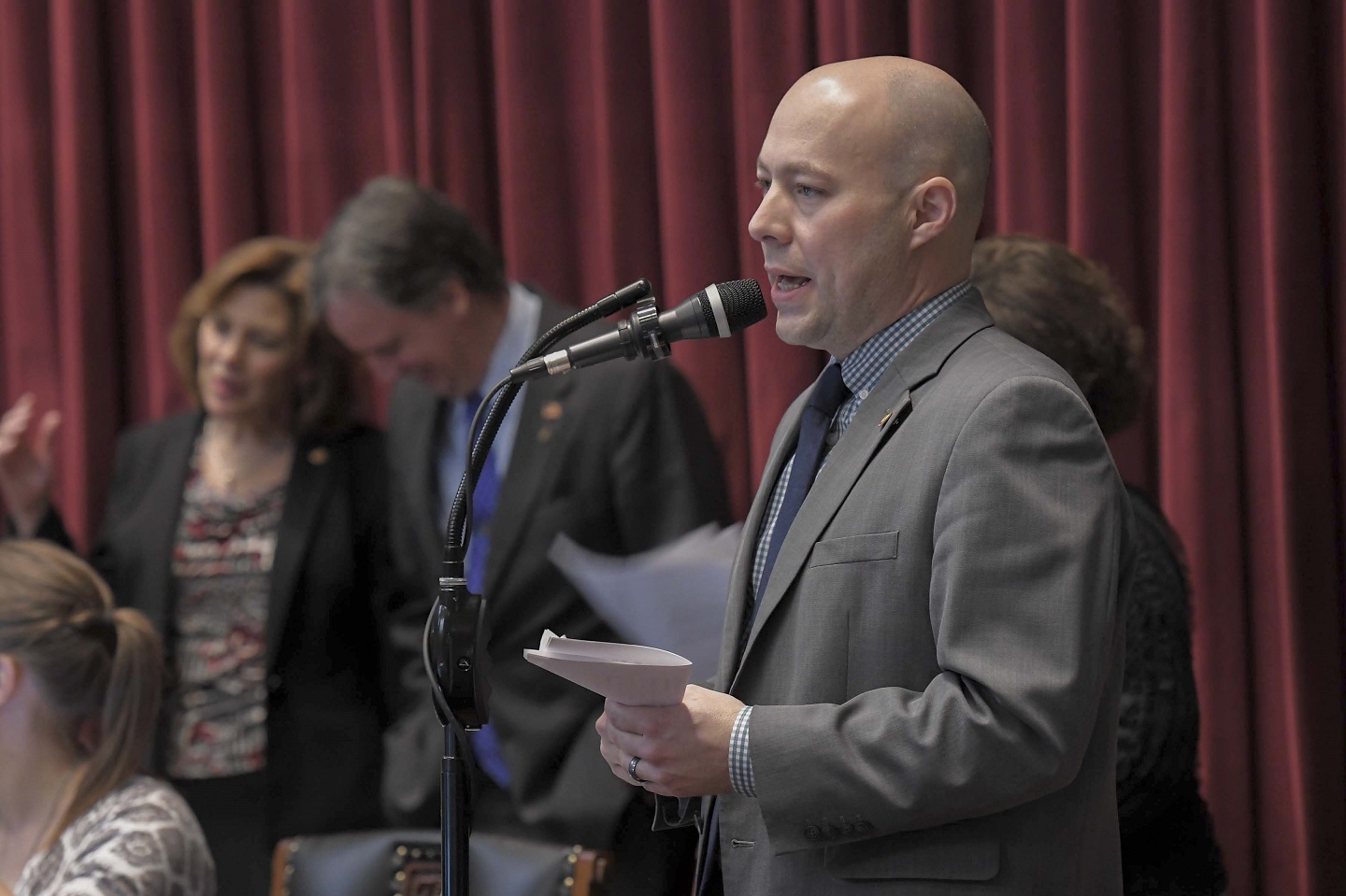
Missouri law requires that offenders with one prior conviction must serve at least 40-percent of a prison term. Those with two prior convictions must serve 50-percent, and those with three or more must serve 80-percent.
House Bill 113 would allow judges to make exceptions to those mandates if, based on certain criteria, those minimums would be unjust to the defendant or unnecessary to protect the public.
“This enables us to, as someone said, differentiate between the folks that we’re scared of and the folks that we’re mad at,” said bill sponsor Cody Smith (R-Carthage).
Supporters say reforms such as those in HB 113 would keep individuals who made bad decisions but aren’t likely to commit further offenses from spending too much time in prison, where they might learn to commit additional and more violent offenses.
Projections say HB 113 will also save the state more than $3-million by 2023, by leading to the release of an estimated 466 prisoners and thereby eliminating the cost of housing, feeding, and otherwise seeing to the needs of those individuals.
Smith notes that those projections don’t include the fact that as recently as last year, Missouri was seen as on pace to need another two prisons in the next five years.
The bill drew broad bipartisan support, passing out of the House 140-17. St. Louis Democrat Steven Roberts said while the bill removes minimum sentences, it doesn’t stop a judge from imposing maximum sentences when appropriate.
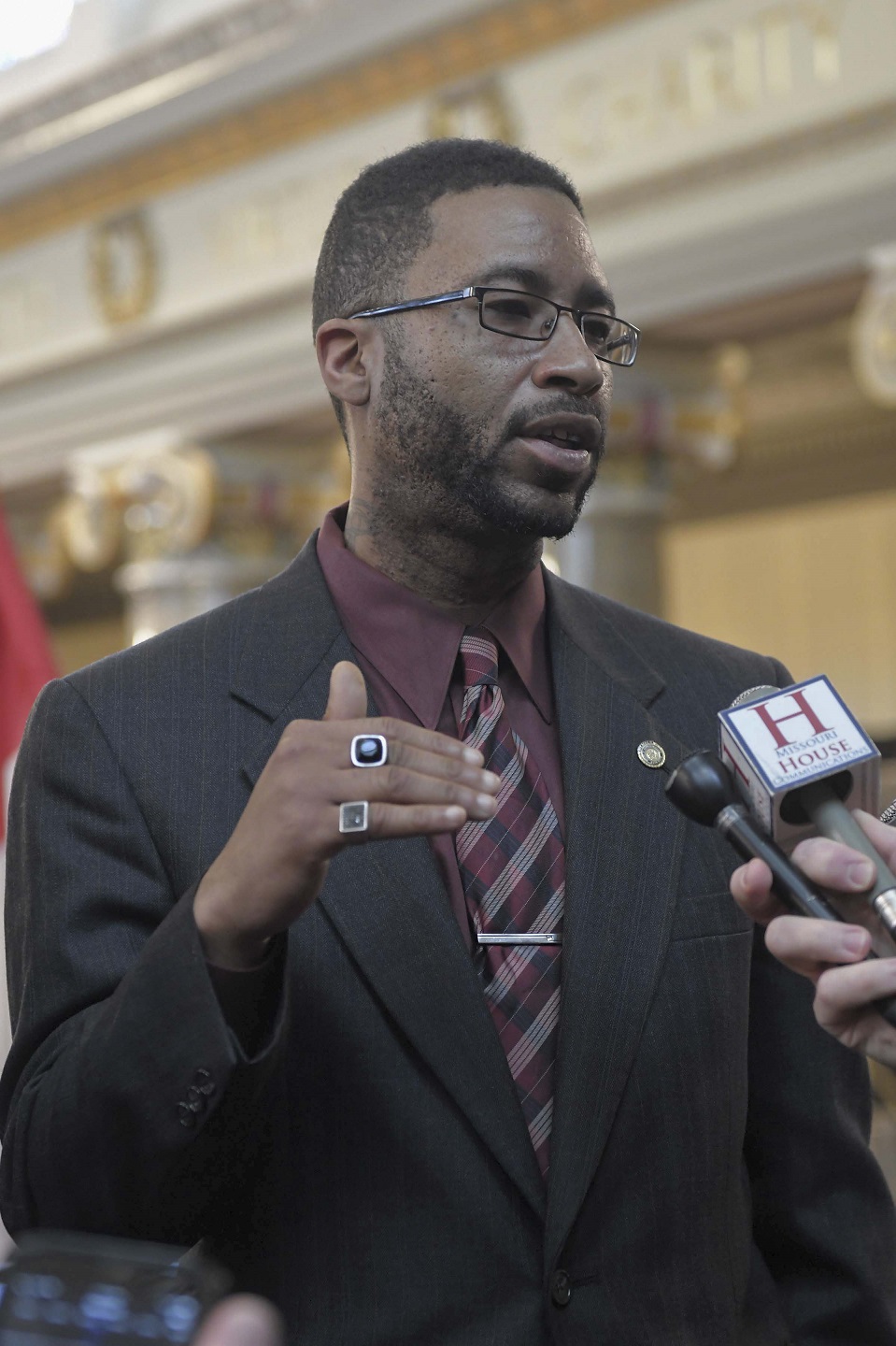
Democrats called the bill a good step in the direction of criminal justice reform, but say they hope to see more.
Kansas City representative Brandon Ellington (D) has filed legislation that would further change the laws regarding minimum sentences, and named other reforms his party supports.
HB 113 now goes to the Senate, where last year’s version of the same legislation was referred to a committee but did not receive a hearing.
Missouri House votes to give judges more freedom from mandatory minimum sentences
The Missouri House has voted to give judges more flexibility in sentencing by easing Missouri’s mandatory minimum sentencing laws.
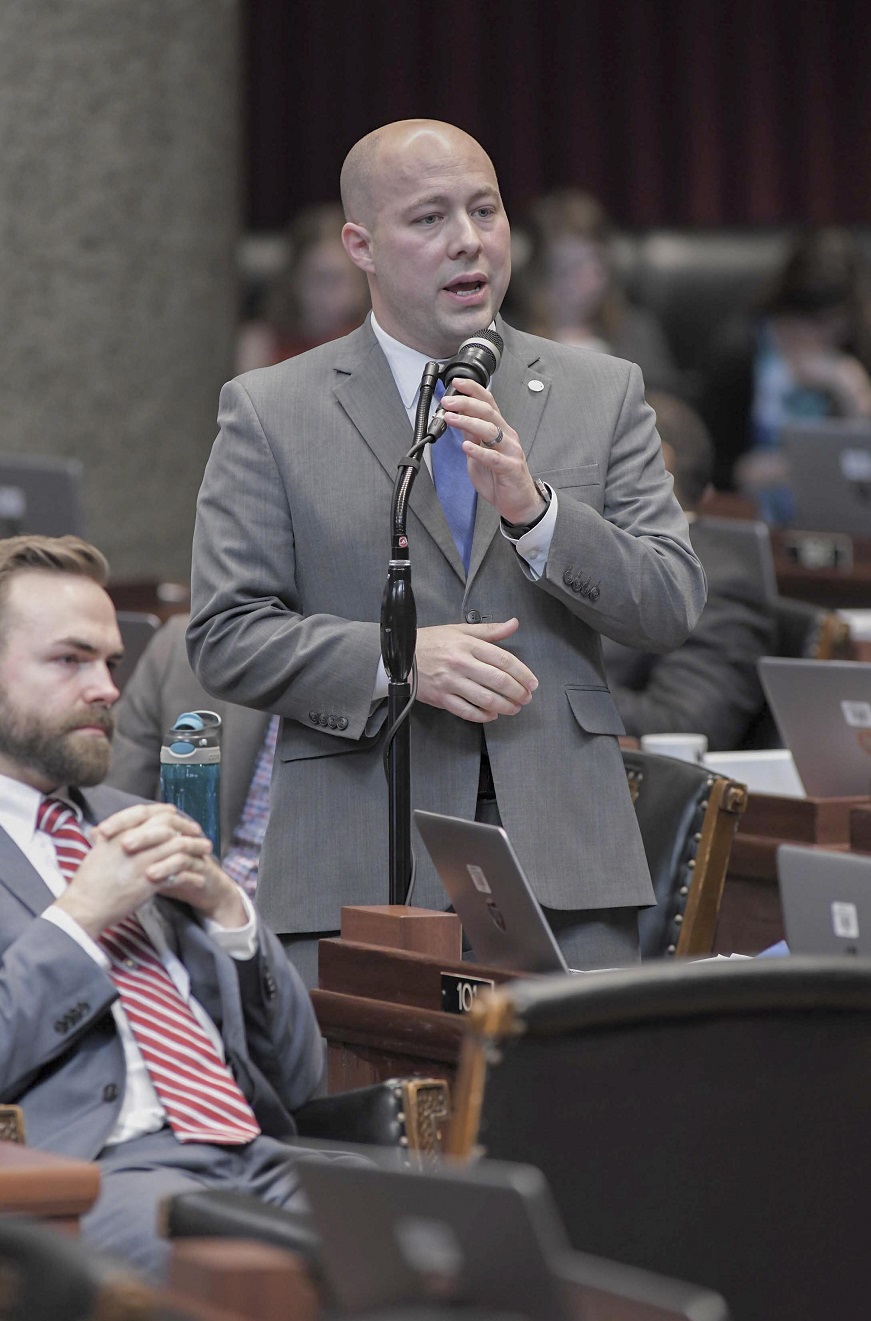
House Bill 1739 would allow judges to issue sentences below those minimums except in crimes that involved the use, attempted use, or threat of physical force, or certain non-consensual sex crimes against a minor. A case would have to have a “substantial and compelling” reason the minimum sentence would be unjust to the defendant or would not be needed to protect the public. The House voted Tuesday to send that legislation to the state Senate.
Carthage Representative Cody Smith (R) sponsors the bill. He said Missouri is on course to need two new prisons that would cost the state more than $485-million over the next five years.
Meanwhile, Smith said, other states where mandatory minimum sentencing laws have been eased have seen crime rates decline rather than increase.
He said nothing about HB 1739, which he calls the “Justice Safety Valve Act,” prevents a judge from handing down a sentence that follows those minimum sentencing laws.
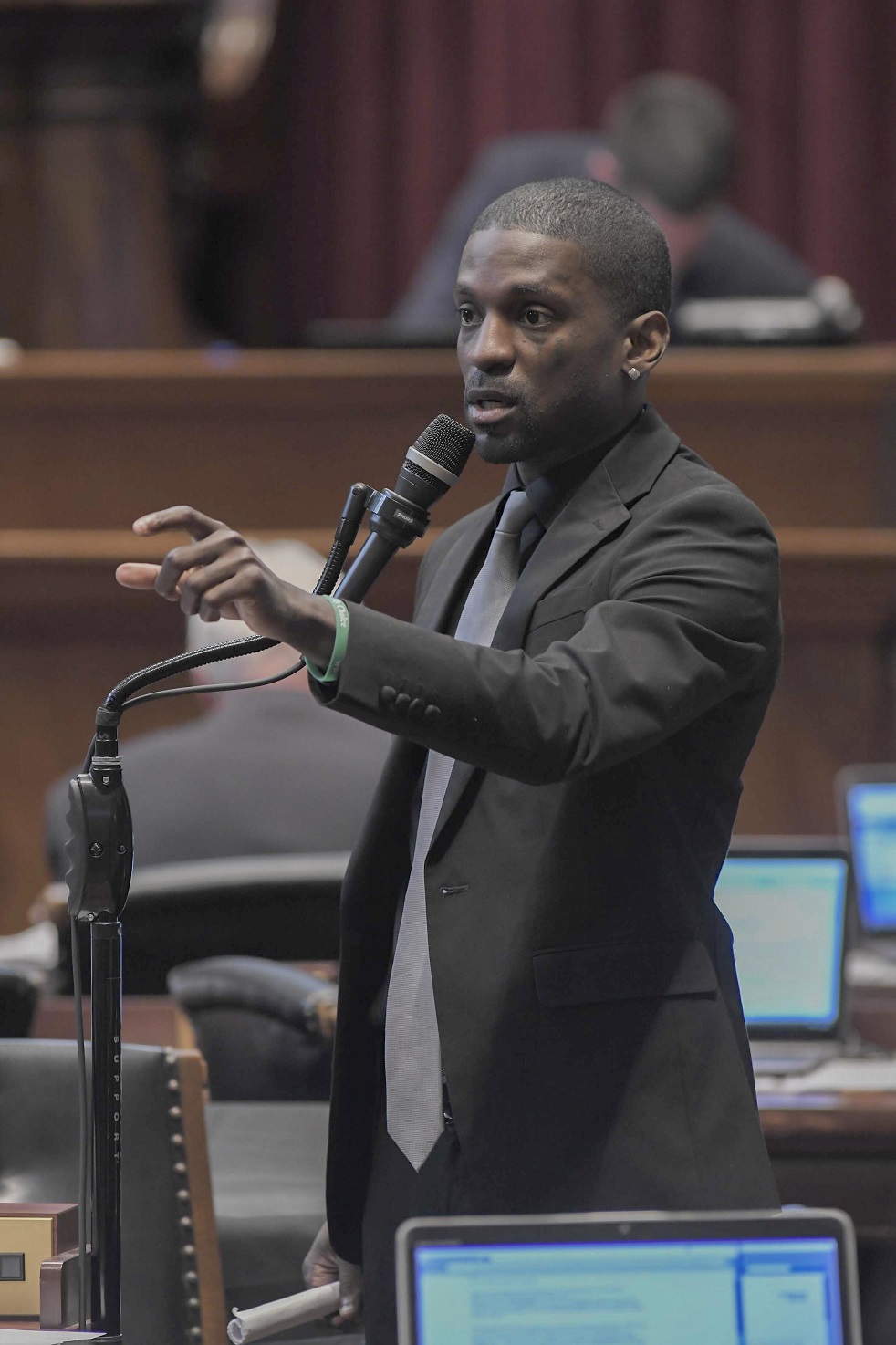
Support for Smith’s bill came from both sides of the aisle, with several lawmakers including Representative Bruce Franks, Junior, (D-St. Louis) saying it is a reversal on what they called a “failed” war on drugs.
Pacific Republican Paul Curtman argued there should be no minimum sentences for any nonviolent crime.
Legislative projections are that HB 1739 would save the state more than $3-million a year by the time it is fully implemented in Fiscal Year 2023, by decreasing the number of people incarcerated in state prisons. That does not account for what the state would save if it does not have to build and maintain those two new prisons.
The House voted 148-0 to send the proposal to the state Senate.
Representative proposes easing of mandatory minimums for some crimes
The state House is being asked to consider giving judges more flexibility about when to impose minimum sentences mandated by Missouri law for many offenses.
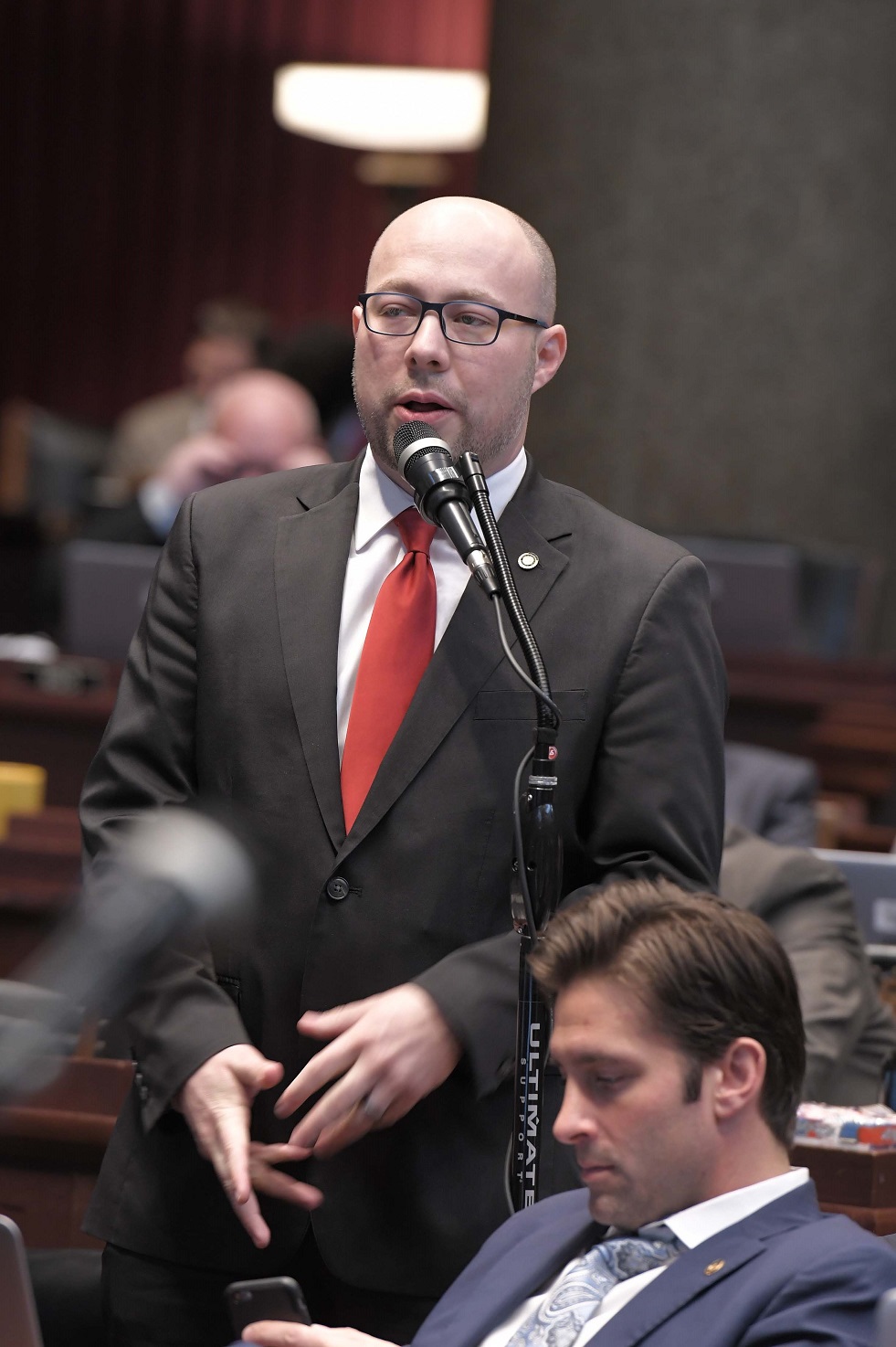
House Bill 1739 would allow judges to depart from those mandatory minimums except regarding crimes that involved the use, attempted use, or threat of serious physical force, or certain non-consensual sex crimes against a minor. The case would have to involve “substantial and compelling” reasons that the minimum sentence would be unjust to the defendant, or would not be needed to protect the public.
It’s sponsored by Carthage Representative Cody Smith (R).
“HB 1739 would permit judges to adjust the length of a prison sentence to fit the crime and a person’s role in it. If someone played a very minor role in a nonviolent offense but still deserves some prison time, the judge could give the person a shorter sentence that is more appropriate for the severity of the crime,” said Smith.
Smith said one of the issues his bill would help address is overcrowding in Missouri’s prisons. It is predicted that Missouri is on pace to need to build two new prisons. The cost to the state to build and operate those is projected at $485-million over the next five years.
Many offenders in Missouri prisons are serving sentences stemming from nonviolent drug offenses. Smith said in such cases, easing mandatory minimum sentencing requirements could allow judges to instead require drug treatment and other programs in lieu of prison time. Smith said treatment outside of prison is typically more effective.
“It’s my understanding that drug treatment in prisons is largely unsuccessful and it’s much more successful outside of prisons through programs like drug courts. To have people working with drug courts or through their probation or parole while they can maintain a job, be with their family presumably, be productive citizens I think is much better than having them incarcerated and trying to do that through prison sentencing,” said Smith. “[Drug issues are] more of a health care problem at this point rather than a criminal justice issue, in my mind.”
Smith said more than 30 states have reduced, eliminated, or reformed mandatory minimum sentences and in those states crime rates have dropped. He thinks the changes to sentencing laws contributed to those drops.
“Once you have a prison sentence you lose your job, often times you lose your family, you are unable to maintain whatever positive momentum you have going in your life. I can see how you would very easily turn back to crime or drugs when you get out of prison, or do something in prison that would keep you there for a longer time,” said Smith. “If you can maintain some semblance of a normal lifestyle – again with your family, with a job, and work with something like a drug court – then you have incentive to turn your life around, and that’s been the case in those states.”
The projected fiscal impact of HB 1739 says it could save Missouri more than $3.1-million once fully implemented. Smith notes that does not include how much the state could save if it is able to avoid building and operating any new prisons.
The bill has been approved by the House Committee on Crime Prevention and Public Safety. It faces another committee, which could vote whether to send it to the full house for consideration.